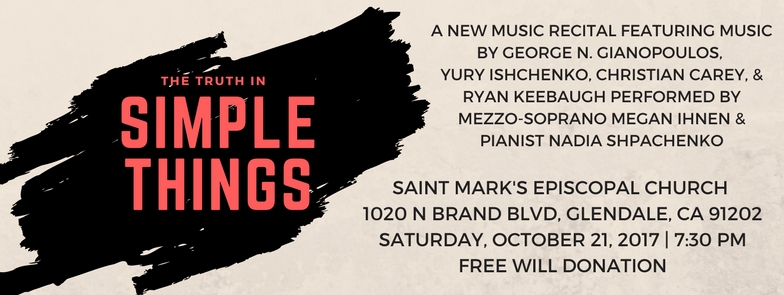
- This event has passed.
Collaborative and solo recital with Megan Ihnen
October 21, 2017 @ 7:30 pm - 9:00 pm

A NEW MUSIC RECITAL FEATURING MUSIC BY GEORGE N. GIANOPOULOS, YURI ISHCHENKO, JOHN CAGE, AND CHRISTIAN CAREY
PERFORMED BY MEZZO-SOPRANO MEGAN IHNEN & PIANIST NADIA SHPACHENKO
Program:
Piano Sonata No. 6 by Yury Ishchenko
Three Songs, Op. 7 (2007) by George N. Gianopoulos
The poetry of the turn-of-the-century Manhattanite Dorothy Parker sets the tone for my Three Songs, Op. 7 for [Mezzo]-Soprano & Piano. Parker’s acidic wit and sass, tongue-in-cheek sentimentality and clever wordplay pervade each of the three poems set. Written in 2007, the Three Songs saw their premiere in 2010 by Greek Soprano Eleni-Lydia Stamellou and were sparingly edited there after. The first, Little Words, penned by Parker in 1931, uses the craft of writing as a metaphor for loneliness and hopelessness. Set against a reflective accompaniment she says ‘The weary pen that sets my sorrow down feeds at my heart.’ The second song, One Perfect Rose, written in 1926, is a light-hearted sassy number filled wit. Set against a bouncy piano part, Parker text is wryly sentimental contrasts with a slower middle stanza before returning to the original character; “Why is it no one ever sent me yet one perfect limousine do you suppose?” she quips sarcastically. The final song, Purposely Ungrammatical Love Song, is taken from Parker’s Death & Taxes written and published in 1931. Musically, this song epitomizes the Art Deco age of New York in the 1920’s with its swinging cabaret accompaniment. The up tempo section captures the flirtatious nature of the text, “There’s better a mile than such is you. But when did I say that I was wise;” A wink and nod.
Three Songs of Shattering for Mezzo-Soprano and Piano, Op. 18 (2009/13) by George N. Gianopoulos
The Three Songs of Shattering, Op. 18 for Mezzo-Soprano & Piano was composed in the winter of 2009-10 and dramatically revised in 2013. The songs are based on American lyric poet, playwright and Pulitzer Prize winner Edna St. Vincent Millay’s poem cycle Three Songs of Shattering, first published in Renascence, and Other Poems in 1912. The first song is a brooding and dissonant setting. “The first rose on rose-tree budded, bloomed and shattered,” Millay reveals and later “Grief of grief has drained me clean.” Clearly she is in a dismal and unforgiving state of emotional torment. The second song is, in comparison, much lighter in character. Opening with a jaunty jazz-fused accompaniment, the mezzo sings “Let the little birds sing; Let the little lamb play.” A slow blues passage marked lento espressivo ushers in the cheerful opening material before pushing the singer to one of her highest notes. The final song in the cycle travels through a kaleidoscope of styles and musical textures. A dramatic maestoso opening sets up future musical material before the entrance of the first rhythmically instable theme in c minor. Echoes of the earlier songs wisp in and out of the musical landscape until a contrasting and very lush, romantic section emerges; “Ere, Spring was gone,” laments the mezzo with a hint of nostalgia. These two themes continue throughout the song in variation and are carefully knitted to weave in and out of one another seamlessly. The cycle is brought to a close in a resounding e-flat major while the singer belts “And weeds were tall on all the paths that led that way!”
City Vignettes for Mezzo-Soprano and Piano, Op. 29 by George N. Gianopoulos
City Vignettes by Sara Teasadale
I. Dawn
The greenish sky glows up in misty reds,
The purple shadows turn to brick and stone,
The dreams wear thin, men turn upon their beds,
And hear the milk-cart jangle by alone.
II. Dusk
The city’s street, a roaring blackened stream
Walled in by granite, thro’ whose thousand eyes
A thousand yellow lights begin to gleam,
And over all the pale untroubled skies.
III. Rain at Night
The street-lamps shine in a yellow line
Down the splashy, gleaming street,
And the rain is heard now loud now blurred
By the tread of homing feet.
Aria by John Cage
3 Kenyon Songs by Christian Carey
“Song” was written for and premiered at the composer’s wedding service. It is one of poet Jane Kenyon’s most serene yet joyful poems. “Otherwise” is a poem about living with a cancer diagnosis. Both Kenyon and her husband the poet Donald Hall battled cancer; Kenyon ultimately succumbed to cancer of the salivary gland in 1995. “Otherwise” is a resilient ode to “living in the moment” while not denying our own frail mortality. “Let Evening Come,” is a humanist, philosophical road map that is analogous to the famous psalm verse, “Yea, though I walk through the valley of the Shadow of Death, I will fear no evil.”
